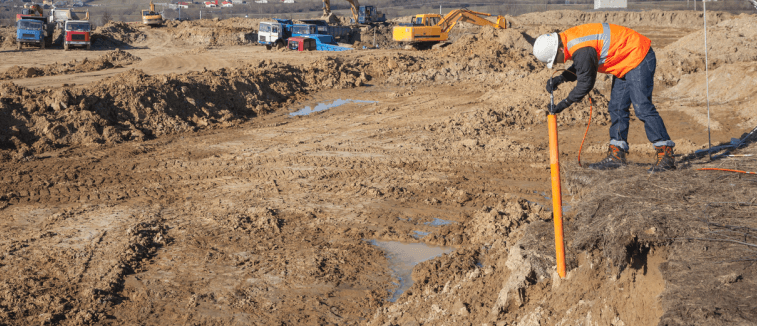Fascination About Geotheta
Fascination About Geotheta
Blog Article
The Geotheta Statements
Table of ContentsThe 5-Second Trick For GeothetaGeotheta Can Be Fun For AnyoneThe Ultimate Guide To GeothetaAll About GeothetaGeotheta Things To Know Before You Get This

They carry out website investigations, collect samples, execute laboratory examinations, and assess data to examine the suitability of the ground for building tasks - Consulting Engineer. Based upon their findings, geotechnical engineers supply recommendations for foundation design, incline security, keeping frameworks, and reduction of geotechnical dangers. They collaborate with other specialists, such as designers, structural engineers, and construction groups, to make certain that geotechnical factors to consider are incorporated into the overall job layout and execution
By examining the behavior and properties of soil and rock, they can identify possible geotechnical risks such as landslides, dirt negotiation, or slope instability. Their proficiency helps protect against failings or crashes that could jeopardize lives and residential property. Here are some comprehensive responsibilities and duties of a geotechnical designer: Site Investigation: Geotechnical designers conduct website examinations to gather information on subsurface problems.
They interpret the data to recognize the residential or commercial properties and actions of the dirt and rock, including their strength, leaks in the structure, compaction qualities, and groundwater problems. Geotechnical Evaluation and Layout: Geotechnical designers evaluate the information collected during site investigations to examine the stability and suitability of the site for building and construction projects. They do geotechnical calculations and modeling to evaluate variables such as birthing capacity, settlement, incline stability, side earth stress, and groundwater flow.
Some Known Details About Geotheta
Foundation Design: Geotechnical designers play a vital role in making foundations that can securely support the intended framework. They examine the soil problems and tons demands to determine the ideal foundation kind, such as shallow structures (e.g., footings), deep structures (e.g (https://myanimelist.net/profile/geotheta)., stacks), or specialized techniques like soil improvement. They consider variables such as negotiation restrictions, birthing capability, and soil-structure communication to create optimum foundation layouts
They review building plans, monitor website tasks, and carry out area evaluations to verify that the layout suggestions are adhered to. If unexpected geotechnical problems develop, they analyze the scenario and offer suggestions for remediation or adjustments to the style. Threat Evaluation and Reduction: Geotechnical engineers assess geotechnical dangers and threats connected with the job website, such as landslides, liquefaction, or soil erosion.

Collaboration and Interaction: Geotechnical engineers work closely with various other specialists involved in a project, such as designers, structural designers, and construction groups. Reliable communication and partnership are necessary to incorporate geotechnical factors to consider right into the total project design and construction process. Geotechnical engineers supply technological experience, response questions, and ensure that geotechnical needs are fulfilled.
Not known Incorrect Statements About Geotheta
Here are some kinds of geotechnical designers: Structure Designer: Foundation designers specialize in developing and examining structures for frameworks. They assess the check out this site soil problems, tons requirements, and website features to figure out one of the most suitable structure kind and design, such as superficial foundations, deep structures, or specialized strategies like stack foundations.
They evaluate the aspects influencing slope security, such as dirt residential or commercial properties, groundwater conditions, and slope geometry, and develop approaches to stop incline failures and minimize dangers. Quake Engineer: Quake engineers concentrate on analyzing and designing frameworks to endure seismic pressures. They evaluate the seismic risk of a website, assess dirt liquefaction possibility, and create seismic design criteria to make certain the safety and security and strength of frameworks during quakes.
They do area testing, collect examples, and analyze the collected information to define the soil residential or commercial properties, geologic formations, and groundwater problems at a website. Geotechnical Instrumentation Designer: Geotechnical instrumentation designers concentrate on tracking and gauging the behavior of dirt, rock, and frameworks. They mount and keep instrumentation systems that monitor factors such as soil settlement, groundwater degrees, incline movements, and architectural displacements to assess efficiency and offer very early warnings of potential concerns.
The 6-Minute Rule for Geotheta
They perform examinations such as triaxial tests, debt consolidation examinations, straight shear examinations, and permeability tests to gather data for geotechnical evaluation and style. Geosynthetics Designer: Geosynthetics engineers focus on the layout and application of geosynthetic products, such as geotextiles, geogrids, and geomembranes. They use these materials to boost dirt security, enhance inclines, give water drainage services, and control disintegration.
They often tend to be investigatory people, which means they're intellectual, introspective, and investigative. They are interested, systematic, sensible, analytical, and rational. Some of them are likewise social, meaning they're kind, generous, participating, person, caring, handy, understanding, tactful, and friendly - Consulting Engineer.
In the office atmosphere, geotechnical engineers make use of specialized software program devices to do estimations, create layouts, and evaluate information. They prepare reports, evaluation job specs, interact with customers and staff member, and coordinate job tasks. The office setting offers a favorable atmosphere for research, analysis, and partnership with various other experts associated with the task.
The Greatest Guide To Geotheta
They regularly visit task websites to perform website examinations, examine geotechnical problems, and gather data for evaluation. These check outs include taking a trip to different locations, sometimes in remote or tough terrains. Geotechnical designers may perform soil sampling, conduct tests, and monitor building and construction activities to make sure that the geotechnical facets of the project are being executed appropriately.
Geotechnical designers likewise work in specialized geotechnical labs. Geotechnical research laboratory engineers work thoroughly in these atmospheres, handling screening tools, running tools, and tape-recording information.
Report this page